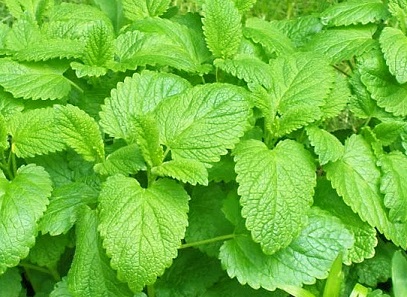Lemon Balm's Promising Role in Boosting Mental Well-Being and Cognitive Function
Nikhil Prasad Fact checked by:Thailand Medical News Team Oct 21, 2024 1 year, 1 month, 4 weeks, 1 day, 4 hours, 27 minutes ago
Herbs And Phytochemicals: Researchers from the University of Reading (UK) and Givaudan France Naturals have been investigating the potential benefits of lemon balm (Melissa officinalis L.), an ancient herb with a history of medicinal use dating back over 2,000 years. The review published in the journal Nutrients explores how lemon balm could play a key role in improving psychological well-being.
 Lemon Balm's Promising Role in Boosting Mental Well-Being and Cognitive Function
What Is Lemon Balm?
Lemon Balm's Promising Role in Boosting Mental Well-Being and Cognitive Function
What Is Lemon Balm?
Lemon balm is a perennial herb known for its lemon-scented leaves. Traditionally, it has been used in herbal medicine to address various ailments such as digestive issues, insomnia, anxiety, and skin irritations. Today, lemon balm is gaining renewed attention due to its potential to support mental health.
The researchers note that lemon balm contains several active compounds like rosmarinic acid, citral, oleanolic acid, and ursolic acid. These compounds are believed to influence brain activity, particularly by interacting with key neurotransmitter systems that regulate mood, anxiety, and cognitive functions.
This
Herbs And Phytochemicals news report sheds light on how lemon balm might help alleviate anxiety, depression, and sleep problems while enhancing cognitive abilities.
Key Findings from the Study
The review emphasizes that lemon balm shows promise for a range of psychological benefits, from improving sleep to reducing anxiety and boosting cognitive performance. The primary mechanisms through which lemon balm works include:
-GABAergic Activity: Lemon balm enhances the activity of GABA, a neurotransmitter that promotes relaxation and reduces anxiety. The herb’s key compound, rosmarinic acid, inhibits the breakdown of GABA in the brain, which helps calm the nervous system.
-Cholinergic Modulation: It also boosts levels of acetylcholine, a neurotransmitter essential for memory and learning. This is particularly important in treating conditions like Alzheimer’s, where cholinergic deficits are common.
-Antioxidant and Anti-inflammatory Properties: The flavonoids and phenolic acids in lemon balm have strong antioxidant effects, reducing oxidative stress and inflammation in the brain. This makes lemon balm a potential neuroprotective agent.
Lemon Balm for Anxiety and Sleep
Lemon balm’s calming effects have been demonstrated in various age groups, including infants, children, and adults. For example, studies on infants with colic showed that daily supplementation with lemon balm significantly reduced crying time, attributed to its calming properties.
In adults, lemon balm has been shown to reduce feelings of anxiety and stress, particularly in situations involving high levels of mental strain. A study on he
althy young adults found that lemon balm improved cognitive performance under stress, particularly in tasks requiring attention and memory.
Lemon balm has also been found to improve sleep quality. In a study involving middle-aged adults, daily supplementation with 320 mg of lemon balm significantly improved sleep scores, reducing restlessness and the time it took to fall asleep.
Lemon Balm for Cognitive Enhancement
The researchers also explored lemon balm’s potential to improve cognitive function. A series of trials revealed mixed but promising results. For instance, participants who took 600 mg of lemon balm showed improvements in attention and memory. However, higher doses (up to 1,600 mg) led to impairments in some cognitive tasks, suggesting that the effects of lemon balm might vary depending on the dose and the type of cognitive task.
In another trial conducted under stress conditions, participants who consumed lemon balm performed better in mathematical tasks and reported feeling calmer. These findings highlight lemon balm’s dual ability to enhance cognitive function while simultaneously reducing stress.
Lemon Balm in Older Adults
Interestingly, lemon balm has been found to benefit older adults, particularly those experiencing age-related cognitive decline. In a clinical trial involving individuals with Alzheimer’s disease, participants who took lemon balm showed significant improvements in cognition, as measured by a standardized cognitive assessment. The herb also helped reduce symptoms of agitation and irritability, which are common in dementia patients.
Although more robust clinical trials are needed to fully understand lemon balm’s potential in this area, the early results are promising.
Potential as an Alternative Therapy
Lemon balm’s wide-ranging effects on mood, anxiety, sleep, and cognition make it a potentially valuable alternative therapy, particularly for individuals seeking natural remedies with fewer side effects than conventional medications.
While lemon balm has been shown to be generally safe and well-tolerated in clinical trials, the researchers call for further large-scale studies to determine the most effective dosages and to explore any long-term effects. They also highlight the importance of standardizing the concentration of active compounds like rosmarinic acid to ensure consistent results across different products.
Conclusion
The review concludes that lemon balm holds significant potential as a natural treatment for mental health issues, particularly anxiety, depression, and cognitive decline. Its ability to modulate neurotransmitter activity, reduce oxidative stress, and improve sleep makes it a promising candidate for further research. However, more rigorous clinical trials are needed to confirm its efficacy and to establish standardized dosing protocols. For now, lemon balm appears to be a safe and effective option for those looking to enhance their psychological well-being naturally.
The study findings were published in the peer-reviewed journal: Nutrients.
https://www.mdpi.com/2072-6643/16/20/3545
For the latest on
Herbs and Phytochemicals, keep on logging to Thailand Medical News.
Read Also:
https://www.thailandmedical.news/news/strategies-to-combat-covid-19-linked-brain-amyloids-and-dementia-alzheimer
https://www.thailandmedical.news/news/the-phytochemical-honokiol-from-the-magnolia-tree-combats-neuroinflammation-and-brain-aging
